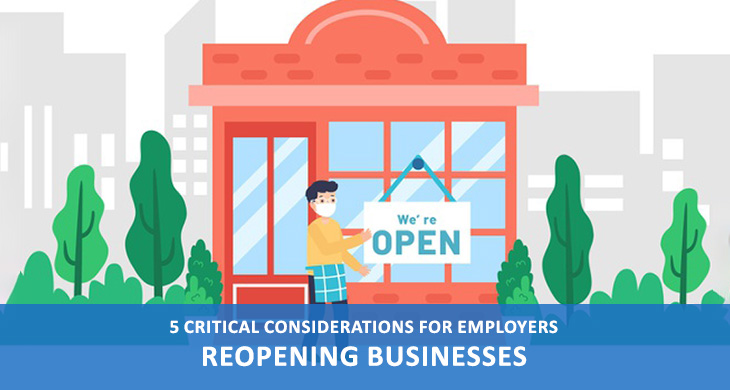Employers all over the country are cautiously reopening businesses as governments, organizations, and individuals attempt to restore some degree of normalcy to their lives. Employers and business owners have keenly felt the impact of the COVID-19 pandemic for more than three months. In reopening, many quite rightly make it a priority to protect their employees while satisfying the demands of running a business in uncertain times
Unfortunately, many businesses are already seeing an influx of employee lawsuits as tensions and fear gives rise to conflict about public health and safety. As a full-service national staffing agency, CGT Staffing makes every effort to ensure a mutually beneficial relationship between the talent we source and the clients with whom we partner.
A critical aspect of this dynamic involves helping employers to understand the expectations and needs of each potential employee, including their perspective on what constitutes a safe working environment ensuring their highest potential and success.
Table of Contents
Five Points for Employers to Consider
With many hoping to see a return to status quo business operations, there needs to be a balanced understanding that the current conditions a departure from the previously accepted norm. There are many new HR regulations and considerations to be addressed, as well as new employee safety regulations and mandated paid leave plans.
All of these need to be addressed to avoid potential lawsuits, or worse, putting your employees at risk. This blog explores five important considerations for employers who are reopening businesses soon, including:
- Reviewing Your Workplace Safety Standards
- Having Dedicated HR Support in Place
- Creating Temporary Policies and Updating Existing Ones
- Evaluating Crisis Management Plans
- Reducing Employee Stress through Communication
Read on for a closer look below.
Reviewing Your Workplace Safety Standards
Under any circumstance, workplace and employee safety should be at the forefront of every employer’s mind. New workplace standards should include mandatory health screenings, social distancing rules, disinfecting processes, and mask protocols.
Most employers will need to ensure they can offer a minimum of six to eight feet between employees at all times. You may also have to replace equipment like the air filters on your central air conditioning. Elevator use should be restricted to a maximum of two people at a time.
Daily workplace readiness standards should cover the following:
Disinfecting procedures should be in place in all workplace environments where employees gather, including office floors, cafeterias, and rec rooms. Alcohol-based hand sanitizers must be made available to employees. Appropriate signage to encourage people to wash their hands correctly for the requisite twenty seconds may also be needed. Shared equipment like telephones, printers, and bathrooms must be regularly disinfected.
Recommended: Hiring Mistakes: The Cost of a Bad Hire
Businesses will also need to create protocols for mandatory health screenings for both employees and customers. Anyone who is manifesting mild to severe symptoms – fever, cough, or other COVID-specific symptoms – should not be allowed to interact with other employees.
Any employee testing positive for COVID-19 should be immediately restricted from office visitation until after recovery. Regardless of testing status, anyone exhibiting symptoms should not be allowed inside the workplace.
Having Dedicated HR Support in Place
Small and medium businesses across America often do not have a formal HR department. This can be a significant problem in these trying times. Many employers have questions about how to proceed under the current circumstances.
Can employers ask employees if they are exhibiting coronavirus symptoms? Can employers ask high-risk employees to stay at home? What should employers do if an employee is exposed to someone diagnosed with COVID-19? These are all critical questions, which require the support of a dedicated HR function.
However, if your business doesn’t have one, you can reach out to third parties like marketing recruitment agencies that offer the support you need.
Creating Temporary Policies and Updating Existing Ones
COVID-19 has prompted changes to employment laws all over the world, including in the United States. Employers need to ensure that their business policies are updated in concert with the ongoing health crisis, including talent acquisition strategies. These policies should both help guide employees through the crisis as well as protect the employer from retaliation. There are several policy updates you can make in the context of employee safety:
- Sick and paid leaves.
- Teleworking and remote teams.
- Staggered work schedules.
Evaluating Crisis Management Plans
The COVID-19 pandemic has exposed just how ineffective most contingency plans can be in the face of a global health crisis. As a best practice, employers should reevaluate their crisis management plans across the board, in order to be better prepared in the event of future outbreaks or pandemics.
Revised crisis management plans should take into account all the lessons Coronavirus has taught us. This will help you meet employee expectations as well as ensure effective employee management well into the future
Reducing Employee Stress through Communication
Effective communication is essential for reopening businesses. Clear communication and transparency can go a long way to help reduce employee stress and build trust. Employers should focus on communicating with their employees, answering questions, and offering guidelines for returning to work.
The return to the workplace is an ideal time to highlight changes in company policy and how those changes might impact employee safety. Effective communication will help employees trust their employer’s decision to reopen their respective businesses.
